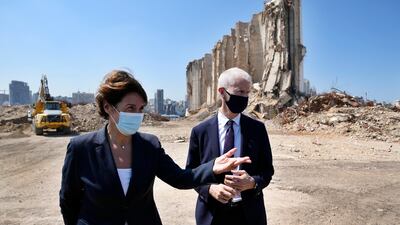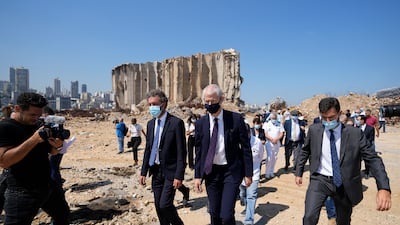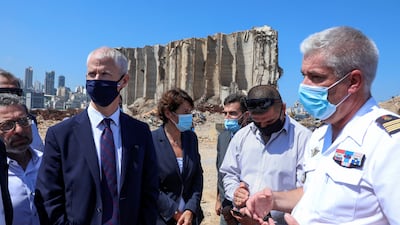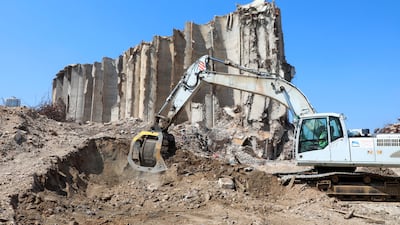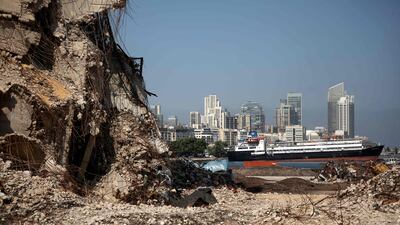Listen to the latest podcast on the Beirut blast here
It has been a year since Marwan Sweidan’s shop in the once-bustling Beirut district of Mar Mikhael was partially destroyed by the shock wave caused by the explosion at Beirut Port.
For months, Mr Sweidan tried, unsuccessfully, to negotiate with his insurance company over a claim of $45,000 for repairs.
“I was offered $2,500 instead as a goodwill gesture but I refused,” Mr Sweidan, one of the thousands of business and property owners who are still awaiting the settlement of their claims as the country marks the first anniversary of the blast, told The National.
Of an estimated $1.1 billion in insured losses, only about $100 million has so far been paid, Mr Assaad Mirza, a board member of Lebanon’s Association of Insurance Companies and the chief executive of Capital Insurance and Reinsurance, told The National.
Mr Mirza said 16,000 claims are pending the outcome of the official investigation into the blast, which killed at least 190 people and injured thousands across the capital.
It remains unclear what triggered the explosion of the hundreds of tonnes of ammonia nitrate, a flammable fertiliser that was improperly stored at a warehouse in the Beirut port for more than six years.
The ammonia nitrate caught fire on August 4, triggering one of the most powerful non-nuclear explosions in history, causing billions of dollars of damage to at least 9,200 buildings within a three-kilometre radius.
There are many questions over who owned the chemicals, what official body was responsible for them and what caused the blast. The answers to these, many hope, will come with the official investigation.
Should the judge leading the probe rule the blast was the result of an act of war or terrorism, 80 per cent of the insurance claims will not be covered, Mr Mirza said.
Significant discount
That possibility, and a lack of trust in the Lebanese authorities’ quest for the truth, have prompted many to settle claims with insurance companies at a significant discount.
Aline Kamakian, the owner of one of the oldest and most celebrated Armenian cuisine restaurants in Beirut, told The National that she settled for 70 per cent of her claim in local dollars, which show on the bank statement but cannot be transferred overseas or withdrawn as banknotes.
These local dollars are US dollars in a Lebanese bank account which are largely inaccessible. Most lenders have put strict caps on withdrawals or overseas transfers since Lebanon’s worst financial and economic crisis unfolded in late 2019, and there is a shortage of the US currency.
Many are agreeing to significant reductions on the face value of those trapped dollars with middlemen to get hold of physical currency, compounding the reduced value of settlements such as Ms Kamakian's.
Of the $100 million in paid claims, the bulk are insurance policies that specifically cover acts of war and terrorism, Mr Mirza said.
Those whose insurance coverage excludes such acts but had their claims settled have nevertheless agreed to refund the insurance companies should the investigation conclude that the explosion was the result of an act of war or terrorism, an insurance broker told The National.
The broker said these insurance claims were being paid in local dollars, as in the case of Ms Kamakian, thus incurring losses up to 80 per cent of the claimed amount.
Andrew Fusco, president of public insurance adjusters WorldClaim, says his company is helping a dozen Lebanese clients to identify and assess damages, hastening the settlement of claims worth several hundred million dollars.
“There is a ton of obstacles, one being the investigation,” Mr Fusco told The National, referring to clients whose policy excludes acts of war or terrorism.
“Insurers are either doing nothing or they are trying to pay by cheque, a non-legal tender currency, a non-transferable currency. To take less money today in dollars or in Lebanese pounds is not going to help Lebanon recover.”
He said some clients with additional political risk insurance had negotiated a segregation agreement to speed up settlement procedures.
“In the event it becomes a political risk claim, the political risk carrier will step in and pick up the claim from that point forward and reimburse the main carrier.”
Mr Mirza said local insurers are expected to pay clients at least 60 per cent of claims in real dollars once international reinsurers release the payments.
International reinsurers have been holding on to payments pending the official outcome of investigations, acting Economy Minister Raoul Nehme has said, with most arrangements between local insurance bodies and international reinsurers excluding acts of war and terrorism.
Mr Mirza said some reinsurers have offered to release payments but only on the condition that local insurers agree to refund them if the investigation reveals the explosion falls under a policy exclusion.
At what stage is the investigation?
The delay prompted the economy minister to ask the lead investigator in February to release his report on the blast and rule out acts of terrorism and war, to speed up the settlement of insurance claims.
However, the minister later backtracked on his demand under pressure from families of victims who accused him of anticipating the investigation’s outcome in a blatant disregard of their quest for justice.
Mr Nehme said his request was intended only to highlight the importance of issuing an official report once investigations are concluded.
In a memo to the investigating judge, which was filed through the Insurance Control Commission, the insurance regulator that reports to Mr Nehme says the value of compensations exceeded the capital of local insurance entities.
The payment of dues by international reinsurers would result in an “inflow of over $1.2 billion from overseas,” the minister wrote at the time.
The investigation has been marred by controversy, with officials bickering over who bears responsibility for allowing the stockpile of explosive chemicals to be stored at the port.
In February, a number of Lebanese lawmakers petitioned the UN to set up an international fact-finding commission to look into the explosion.
The petition came after the appointment of a new lead investigator after the supreme court ruled to remove Judge Fadi Sawan at the request of two of four officials he had indicted in the case.
Judge Sawan had charged caretaker prime minister Hassan Diab and three former ministers, who are also members of parliament, with criminal negligence over the blast.
All four argued that the judge had no authority to indict them under the constitution, which grants immunity from prosecution to MPs and ministers for decisions related to their work.
His successor, Judge Tarek Bitar, has summoned all four, along with other top security officials for questioning again and asked parliament to lift immunity on the three indicted MPs.
However, his request has yet to be approved, with major political parties arguing that officials should be tried before a special body that brings together MPs and high-ranking judges, a move that families of victims say is an attempt to derail justice.












